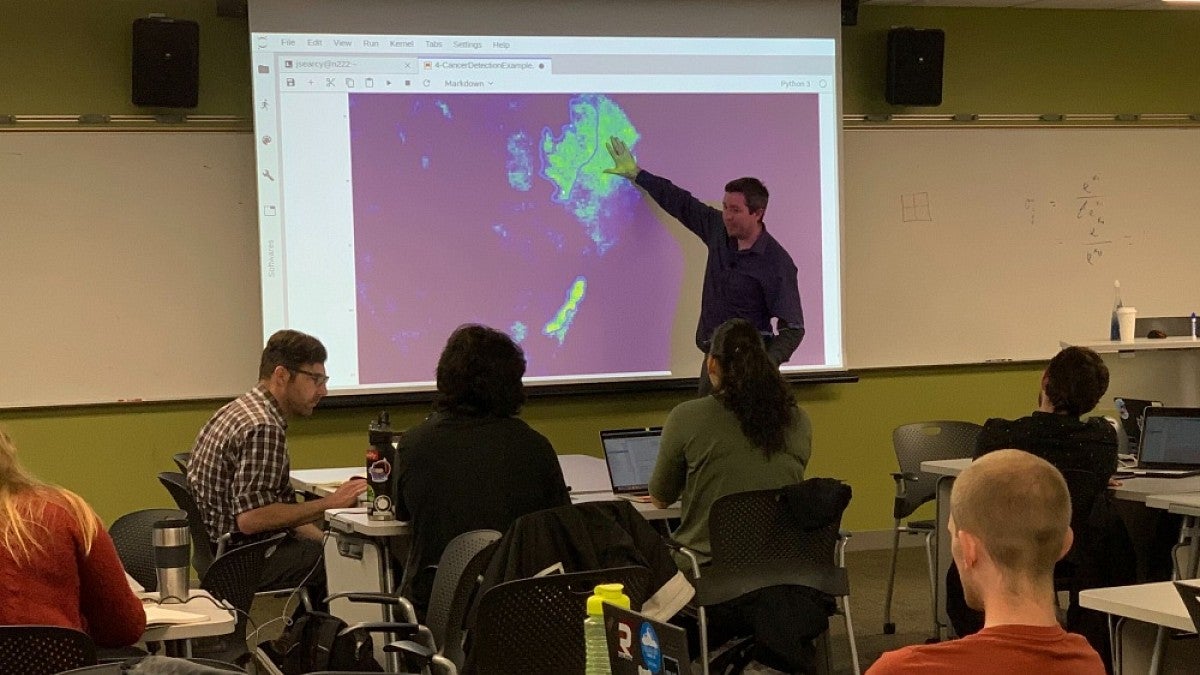The University of Oregon is part of a new National Science Foundation-funded effort that will help data scientists collaborate on efforts to address such challenges as earthquake preparedness, securing electrical power systems and improved environmental health across the Pacific Northwest.
“We are proud to have a leading role along with our fellow scientists at Oregon State University and Portland State University,” said Jake Searcy, associate director of artificial intelligence for both the UO’s Data Science Initiative and Research Advanced Computing Services and a co-leader on the project. “This grant will help us supercharge existing research at the UO and around the state with expertise and training in data science.”
The project will make use of the increasing capabilities of powerful computing technologies that can help researchers address major challenges through use of large datasets and complex modeling, said principal investigator Brett Tyler, director of OSU’s Center of Genome Research & Biocomputing.
“This funding will provide access to those technologies to a range of scientists at institutions across our region to help them generate discoveries in fields including biology, forestry, engineering, energy and marine sciences,” Tyler said.
Portland State’s efforts will be led by Jason Podrabsky, a biology professor.
“This is a great example of how the UO’s Data Science Initiative allows us to combine strengths with other Oregon universities to help create a strong, interdisciplinary effort in the state,” said Bill Cresko, executive director of the UO’s Data Science Initiative and a professor of biology. “Across disciplines, work like this allows us to make decisions earlier, faster and better.”
Earthquakes, electrical power and the region’s overall health infrastructure are among the major societal challenges the project addresses. This funding will help researchers to:
- Integrate of massive amounts of data to produce accurate, actionable forecasts of earthquake and tsunami impacts and how to mitigate them.
- Develop of sophisticated management systems that can detect, respond to, and recover from cyberattacks on electrical power systems.
- Acquire environmental data including that about harmful chemicals, microbial and plankton populations, endangered species, plant and animal health, and features of the built environment, and to integrate those complex data into models that can inform better management practices.
The project will establish a team of data analytics and training professionals at the three universities to disseminate expertise and training materials in data integration, data analytics and machine learning. The team’s leaders will provide research consultations and training to researchers across the region.
Partnerships will be established with other colleges and universities in Oregon and southern Washington, including several Hispanic-serving and Native American-serving institutions, through research collaborations, summer research opportunities for students, training faculty, collaboratively developing curriculum and online program activities.
A multicampus training program will include short courses and colloquia, contributions to existing data analytics courses, webinars and online materials, and a cross-institutional users’ group. Leaders of the project expect it to establish a long-term presence in the region beyond the life cycle of the grant.
Research partners in the project include Lewis & Clark College, Washington State University Tri-Cities, Blue Mountain Community College, Linn-Benton Community College, Western Oregon University, Washington State University Vancouver, Reed College, Chemeketa Community College, Southern Oregon University, Oregon Health & Science University, Heritage University, Linfield College and Mt. Hood Community College.


